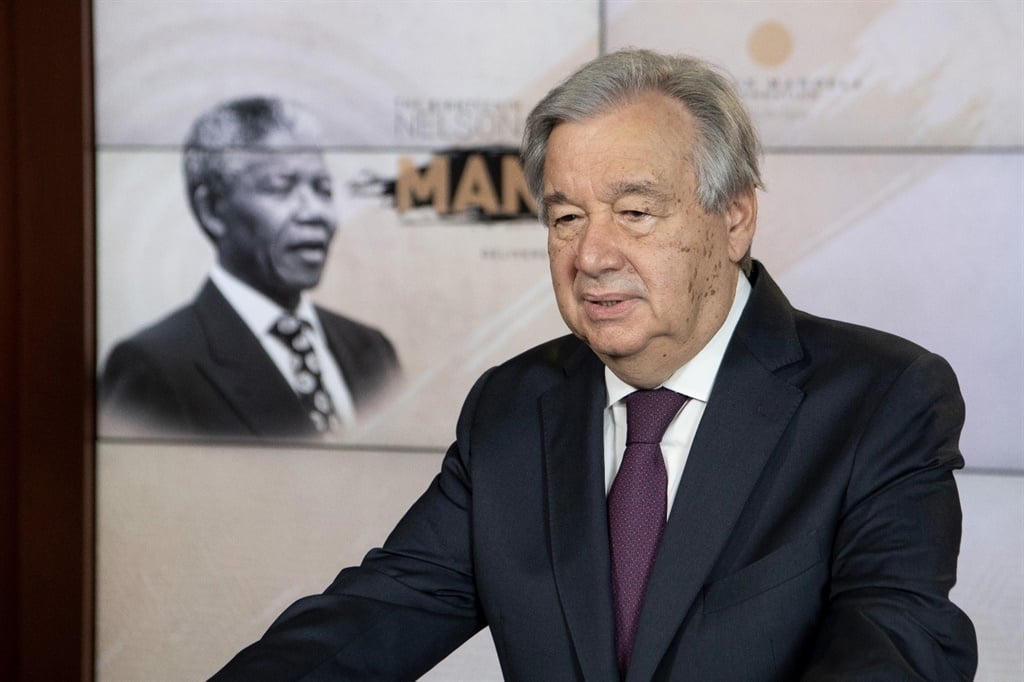


UN Secretary-General, António Guterres.
- UN secretary-general, António Guterres did not mince his words when he called on governments and private elites to do better when it comes to transforming inequalities.
- He was delivering the 18th Nelson Mandela Lecture under the theme: “Tackling the inequality pandemic: A new social contract for a new era”.
- He said Covid-19 exacerbated weaknesses in society, politics and economics.
In no uncertain terms, United Nations secretary-general, António Guterres, put into clear perspective stark social, economic, political and global inequalities rampant today and added that a new social contract was needed to bridge these gaps.
LIVE | All the latest coronavirus and lockdown updates
Speaking at the 18th Nelson Mandela Annual Lecture, Guterres did not mince his words, saying the world had “been brought to our knees – by a microscopic virus”.
“The pandemic has demonstrated the fragility of our world.”
WATCH | ‘Covid-19 must lead to new global deal and social contract’ – UN Secretary-General Guterres
His lecture laid bare the greed among elite private business and people who played a role in exacerbating inequalities well before the Covid-19 pandemic.
“More than 70% of the world’s people are living with rising income and wealth inequality. The 26 richest people in the world hold as much wealth as half the global population,” Guterres said.
He added: “But income, pay and wealth are not the only measures of inequality. People’s chances in life depend on their gender, family and ethnic background, race, whether or not they have a disability and other factors.
“Multiple inequalities intersect and reinforce each other across the generations. The lives and expectations of millions of people are largely determined by their circumstances at birth.”
“Even before the Covid-19 pandemic, many people around the globe understood that inequality was undermining their life chances and opportunities.
“They saw a world out of balance. They felt left behind. They saw economic policies channelling resources upwards to the privileged few.”
Guterres added that with the expansion of trade and technological progress, shifts in income distribution were seen on an unprecedented level.
“Between 1980 and 2016, the world’s richest 1% captured 27% of the total cumulative growth in income.
“Low-skilled workers face an onslaught from new technologies, automation, the offshoring of manufacturing and the demise of labour organisations.
“Tax concessions, tax avoidance and tax evasion remain widespread. Corporate tax rates have fallen,” he said.
Because of this, investment in resources that may reduce inequality – such as social protection, education and healthcare – has been scant, he added.
Growing distrust in institutions and leaders is also a threat to sustainable development, Guterres added.
“The new social contract between governments, people, civil society, businesses and more must integrate employment, sustainable development and social protection, based on equal rights and opportunities for all,” he said.
“Taxation and redistribution policies also have a role in the new social contract. Everyone – individuals and corporations – must pay their fair share,” he added.
In a statement which hit home for many South Africans, Guterres addressed rampant corruption.
“There is a place for taxes that recognise that the wealthy and well-connected have benefited enormously from the state, and from their fellow citizens”.
“We must break the vicious cycle of corruption, which is both a cause and effect of inequality. Corruption reduces and wastes funds available for social protection; it weakens social norms and the rule of law.
“And fighting corruption depends on accountability. The greatest guarantee of accountability is a vibrant civil society, including a free, independent media and responsible social media platforms that encourage healthy debate,” he said.
He also addressed the failures of the global political and economic system which was not delivering critical public goods, such as healthcare, climate action and development.
“The Covid-19 pandemic has brought home the tragic disconnect between self-interest and the common interest; and the huge gaps in governance structures and ethical frameworks,” Guterres said.
READ | Nelson Mandela Lecture: UN head says a new social contract is needed amid rampant inequality
However, he added: “A new global deal, based on a fair globalisation, on the rights and dignity of every human being, on living in balance with nature, on taking account of the rights of future generations, and on success measured in human, rather than economic terms, is the best way to change this.”
“Nelson Mandela said: ‘One of the challenges of our time … is to reinstil in the consciousness of our people that sense of human solidarity, of being in the world for one another and because of and through others.'”
“The Covid-19 pandemic has reinforced this message more strongly than ever,” Guterres said.
Stay healthy and entertained during the national lockdown. Sign up for our Lockdown Living newsletter. Sign up and manage your newsletters in the new News24 app by clicking on the Profile tab

